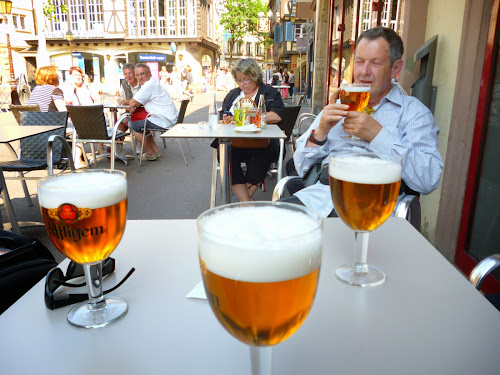I hope you are well and enjoying a pleasant summer vacation away from the travails of presidency. As a loyal Australian who once won second prize in an Alliance Francais competition for aural comprehension, I appreciate you making time to talk to our prime minister, M. Rabbit, whose aural comprehension has been under some scrutiny in recent times, and sincerely hope he didn't bore you too much with his stories about women and the difficulties he has in this department, as we know you have enough to deal with yourself regarding the women issue.
 |
| Garis, checking Garmin. Again! |
However, I must get to the point. I shall not prevaricate any longer than it takes to congratulate you on a fine and beautiful country that produces and serves fine food and wine, takes recycling seriously and obviously enjoys soccer, or football as I know you prefer to call it. But to the point I must head, and the point, or actually the points are, and I hasten to add I have great regret in informing you of these points, but someone must in the best interests of international bike riders.
Let me begin. Firstly, your bike paths when we find them are generous and wide. But as you may have guessed, being a man of considerable competence, the point here is 'when we find them'. Signage, M. Hollande, is vital. One cannot expect international randonneurs to puzzle over goat track markings, wade knee high through corn crops and take direction from road construction crews, when just across the border in organised Germany, clear markings exist everywhere in all directions. Your colleague Angela has received correspondence, it is true, about some of the rough surfaces in her country, but we cannot fault her on signage.
 |
| Where does it state that tractors can bump bike riders off roads? |
Then there is the small but significant matter of street signs in villages. This is related to the first point. How can we find our nightly accommodation in villages that are apparently sans signage?
It is also disconcerting to be riding along a pleasant road on a well-marked bike path only to find the markings disappear. Indeed, sometimes, we are faced with a big sign showing a bike with a cross though it. Levitation is difficult, deviation problematic and recalibration of route troublesome.
 |
| Garis and Maggie calorie loading |
We would appreciate your direction in this issue, as we have been confused time and again as to what we supposed to do in such a circumstance.
 |
| Maggie's choice |
In a country that loves food so much, why, M. Hollande, do we end in so many food deserts? Bike riders need to be nourished at morning tea time, again for lunch, and most importantly post-ride. Ice-cream and beer are just plainly inadequate. You must require hotels to stock delicious and wholesome snacks. We expect no less.
 |
| Tunnels can be fun, but why did we have to climb so far to find one? |
 |
| an out of the way morning coffee stop |
M. Hollande, thank you for your patience in reading my letter outlining small but vitally important problems that, in my opinion, require your immediate attention.
In closing, I wish you a lovely summer holiday with whoever is with you at present, and hope that you will take in hand the matters I raise and there be no further need for correspondence.
Regards, Janice
 |
| The Saone |






































